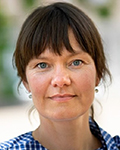Lab members

Lene Vase, MSc (psychology), PhD (psychology, 2006), DMSc (medical science, 2018)
Professor of neuroscientific psychology, visiting professor abroad, at, e.g., Harvard Medical School, USA.
Research focus: Psychological and neurobiological mechanisms involved in placebo and nocebo effects across disorders of the central nervous system, for instance pain, Alzheimer’s disease and Parkinson’s disease. These mechanisms are studied in relation to pharmacological and non-pharmacological treatments such as surgery, deep brain stimulation, spinal cord stimulation, psychotherapy, music, acupuncture, physiotherapy and animal-assisted therapy.
Research funding: My research is funded by the Lundbeckfonden, the Danmarks Frie Forskningsfond, the Aarhus Universitets Forskningsfond, the Innovationsfonden, the National Institute of Health, the Innovative Medicine Initiative and International Network Programme, the Danish Agency for Science, Technology and Innovation. In addition, several projects are funded by the Trygfonden and the Parkinsonforeningen.
Publications and outreach: I have more than 100 peer-reviewed international publications, and my research has been published in leading journals such as The Lancet, The British Medical Jounal, The Lancet Neurology, JAMA Psychiatry and Psychotherapy and Psychosomatics. My research has been cited in international media such as the New York Times, Der Spiegel and the Sydney Morning Herald, and I frequently present my research at international conferences such as the World Congress of Pain.

Sigrid Juhl Lunde, MSc (psychology), PhD (psychology)
Postdoc at the PN Research Lab, Neuroscientific Research Unit
Research focus: My primary research areas include non-pharmacological treatment of pain and placebo effects on pain, focusing on underlying psychological and neurobiological mechanisms.
Background: About 20% of the Danish population suffer from and live with pain. Around the world, there is an increase in the number of chronic pain patients and a growing opioid crisis in terms of excessive use and dependency of opioid drugs; therefore there is a distinct need for non-pharmacological, complementary methods for treatment of pain. A decisive factor for the use of such treatments – e.g., music and animal-assisted therapy – is that there is no risk for side effects as is often the case with ordinary medical treatments. At the same time, there is a need for more stringent methods of investigation documenting the effect of such treatments. Therefore, in cooperation with researchers from, for instance, Center for Music in the Brain and Harvard Medical School, I study which specific and non-specific components are involved in complementary pain treatment in order to specify how they influence our experience of pain and underlying neurobiology.

Mette Sieg, MSc (health psychology), PhD student
PhD student at the PN Research Lab, Neuroscientific Research Unit
Research focus: My research primarily concerns the negative effects of informed consent and how these effects are mediated and moderated by patient expectations, doctor-patient relationship and other contextual factors.
Background: Informed consent is an important foundation in the practitioner-patient relation and fundamental patient rights. However, some studies have indicated that the information patients are given regarding treatment before giving informed consent, may actually increase the risk of experiencing side effects subsequently. This means that, by respecting the patient’s right to informed consent, the practitioner may potentially harm the patient unnecessarily. As this research area is relatively new, our knowledge about the negative effects of informed consent is still sparse. I cooperate with researchers from Maryland University, the University of Toledo and Aarhus University Hospital, on investigations of how much information on side effects the general population wish to have and to which degree information on side effects influences the prevalence of side effects in connection with heart surgery. All of this in an attempt to uncover how the nocebo effect of informed consent is best minimized in clinical practice.

Andrea Søndergaard Poulsen, certified MSc in psychology, PhD student
PhD student at the PN Research Lab, Neuroscientific Research Unit
Focus areas: In my research, I investigate how to optimize the treatment of motor symptoms and pain in patients with Parkinson's disease.
Research background: Motor symptoms is one of the most impairing features of Parkinson's disease, and up to 95% of people with Parkinson´s disease experience pain, which often has a significant impact on quality of life. Levodopa is the most widely used treatment for motor symptoms in Parkinson's disease and in addition, it has a positive effect on pain in Parkinson’s disease. However, the effect of levodopa often wears off after a few years of administration. Thus, the primary aim of my research is to investigate how we can optimize levodopa's effect on motor symptoms and pain in patients with Parkinson's disease. In my research, I collaborate with fellow scholars from Aarhus University Hospital etc.. The purpose of my research is to optimize knowledge on how we can improve treatment of motor symptoms and pain in patients with Parkinson's disease.

Johanne Marie Berg Thøgersen, MSc (psychology), PhD student
PhD student at the PN Research Lab, Neuroscientific Research Unit
Focus areas: My research primarily concerns the use of audiovisual interventions, including virtual reality, for pain management in patients with rheumatoid arthritis.
Research background: Rheumatoid arthritis is a widespread chronic autoimmune disease that often significantly affects individual life expression and quality of life. Around 50% of patients with rheumatoid arthritis experience chronic, persistent pain that is difficult to treat with conventional methods. Therefore, there is a pronounced need for effective, non-pharmacological treatment methods for this patient group. In collaboration with researchers and clinicians from the Clinic for Joint and Connective Tissue Diseases at Aarhus University Hospital, my research investigates how virtual reality can be used to alleviate pain and increase self-management in patients with rheumatoid arthritis. The purpose of this knowledge is to improve the way we investigate the effect of virtual reality interventions and to enhance the established treatment offerings for patients with chronic arthritis pain.